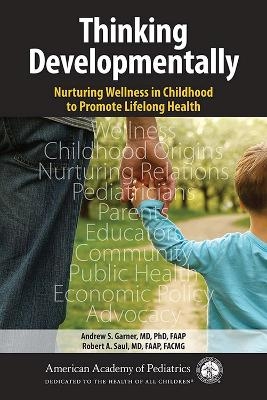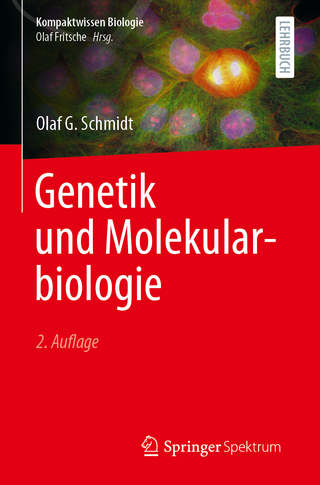
Thinking Developmentally
American Academy of Pediatrics (Verlag)
978-1-61002-152-4 (ISBN)
Childhood experiences can affect a person’s lifelong health. Thinking Developmentally presents a clinical framework for understanding the impact of toxic stress and both adverse and affiliative childhood experiences on development. It makes a compelling case that many diseases of adulthood are not adult-onset, but rather adult-manifest, based on genetic and epigenetic consequences from early childhood experiences. Garner and Saul examine the needs of children and the role of parents, caregivers, the community, and medical practitioners in ensuring that children have safe, stable, and nurturing relationships. They explore community empowerment and offer suggestions for applying developmental science to help bring about healthy children, nurturing families, and caring communities.
Andrew Garner, MD, PhD, FAAP, is a graduate of Swarthmore College and a product of both the Medical Scientist Training Program at Case Western Reserve University (CWRU) and the Pediatric Residency Training Program at the Children's Hospital of Philadelphia. Dr. Garner has practiced primary care pediatrics with University Hospitals Medical Practices in Cleveland since 2000. He is a Clinical Professor of Pediatrics at the CWRU School of Medicine, and a Faculty Associate with the Schubert Center for Child Studies. As a member of the American Academy of Pediatrics (AAP) Committee on Psychosocial Aspects of Child and Family Health, Dr. Garner co-authored the AAP’s Policy Statement and Technical Report on childhood toxic stress. He has also served the AAP as the Chair of the Leadership Workgroup on Early Brain and Child Development, and as a member of the Leadership Workgroups on Epigenetics and Poverty. In addition to cherishing some quality time with his wife (Sharon), son (Timothy), daughter (Deborah), and dog (Bear), Dr. Garner likes to fish, hike, canoe, and watch baseball. Born and raised in the Chicago area, Bob Saul graduated from Colorado College (Colorado Springs, CO) and from the University of Colorado School of Medicine. He completed a residency in pediatrics at the Duke University Medical Center and a fellowship in genetics at the Greenwood Genetic Center. He was in Greenwood, SC from 1979 until 2013 at the Greenwood Genetic Center and also practiced pediatrics for 24 years. He is currently the Medical Director of General Pediatrics, Senior Medical Director of Medicaid Practices, and Clinical Professor of Pediatrics at the Children’s Hospital, Greenville Health System and the University of South Carolina School of Medicine – Greenville. He was the Chair of the Section on Genetics and Birth Defects and the Committee on Genetics of the American Academy of Pediatrics and served as project co-director of the AAP Genetics in Primary Care Institute. He serves on the AAP National Conference and Exhibition Planning Group. He edited the AAP policy manual Medical Genetics in Pediatric Practice, which received an honorable mention in the American Medical Writers Association Medical Book Awards for 2014. He was recently accepted into membership of the American Pediatric Society.
Introduction: The Pediatric Way
Part I: Advances in Developmental Science
Chapter 1: Life Course Science and the Proverbial "Black Box"
Chapter 2: Defining Adversity and Toxic Stress
Chapter 3: Epigenetics
Chapter 4: Developmental Neuroscience
Chapter 5: Thinking Developmentally
Part II: Translating Developmental Science Into Practice and Policy
Chapter 6: The Biological Needs of Children
Chapter 7: Supporting Parents and Caregivers
Chapter 8: The Role of Communities
Chapter 9: The Role of Pediatric Care
Chapter 10: Implications for Pediatric Advocacy and Public Policy
Epilogue: Hopes and Dreams
Appendix A: Glossary of Terms, Concepts, and Abbreviations
Appendix B: Abridged, Amended Version of the AAP Blueprint for Children
| Erscheinungsdatum | 04.08.2018 |
|---|---|
| Verlagsort | Elk Grove Village |
| Sprache | englisch |
| Maße | 152 x 229 mm |
| Gewicht | 368 g |
| Themenwelt | Medizin / Pharmazie ► Medizinische Fachgebiete ► Pädiatrie |
| Medizin / Pharmazie ► Pflege ► Kinderkrankenpflege | |
| Studium ► 2. Studienabschnitt (Klinik) ► Humangenetik | |
| ISBN-10 | 1-61002-152-5 / 1610021525 |
| ISBN-13 | 978-1-61002-152-4 / 9781610021524 |
| Zustand | Neuware |
| Haben Sie eine Frage zum Produkt? |
aus dem Bereich


